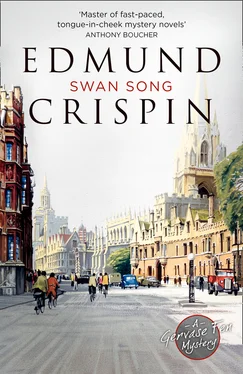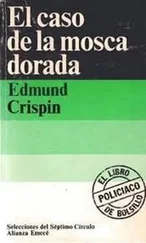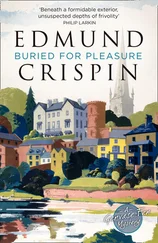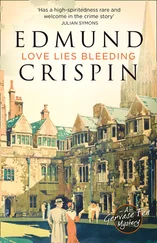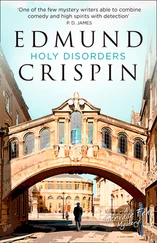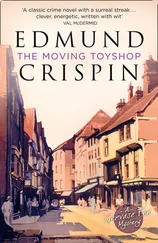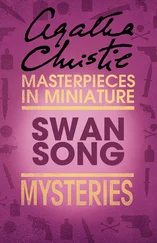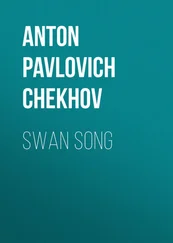He had no difficulty in entering the opera-house – indeed, the stage door stood wide open, though the little foyer inside, with its green baize notice-board and its single frosted bulb, was deserted. By about twenty-five past eleven he had retrieved his pocket-book and was preparing to depart.
His dressing-room was on the first floor, and his decision to go down in the lift must therefore be ascribed solely to enjoyment of the motion. He pressed the button, and the apparatus descended. He climbed in, and traversed the short distance to the ground floor. Then, feeling this short journey to be inadequate, he ascended again, this time to the second floor. Through the iron gates he could see the long, gloomy corridor of dressing-rooms, the gleam of the telephone fixed to the wall at the far end, and the rectangle of yellow light which came from the open door of the stage door keeper’s bedroom. After a moment, the stage door keeper himself shuffled out of it. He was an old man named Furbelow, with wispy hair and steel-rimmed spectacles. Adam, sensing perhaps that his presence required some explanation, opened the lift gates and greeted him.
‘Ah, sir,’ said the old man with some relief. ‘It’s you.’
Adam accounted dutifully for his late visit. ‘But I’m surprised,’ he added, ‘to find you still up.’
‘I’m always up till midnight, Mr Langley, and I keep the stage door open till then. But it’s cold down below, so I comes and sits up ’ere during the last part o’ the evening.’
‘I should have thought it was equally cold up here, if you keep the door of your room open.’
‘I as to do that, sir, when the electric fire’s on. Them things exude gases,’ said Furbelow a shade didactically. ‘You ’ave to ’ave ventilation when they’re alight.’
Adam, though doubting if there was much basis for this assertion, was not sufficiently interested in the stage door keeper’s domestic affairs to argue about it. He said goodnight and left the theatre. As he was walking away, a car drew up, and its occupant, a man, hurriedly entered the stage door. Adam experienced a mild curiosity, but he did not linger, and by the time he had arrived back at the hotel the incident was forgotten.
Meanwhile, in a dressing-room almost directly opposite to Furbelow’s open door, Edwin Shorthouse swayed a little in a cold draught. Now and again the rope creaked against the iron hook from which he was suspended, but that was the only sound.
‘It argues a certain poverty of imagination,’ said Gervase Fen with profound disgust, ‘that in a world where atom physicists walk the streets unharmed, emitting their habitual wails about the misuse of science by politicians, a murderer can find a no more deserving victim than some unfortunate opera singer …’
‘You’d scarcely say that,’ Adam answered, ‘if you’d known Shorthouse. He will not be very much mourned.’
The three men paused on the kerb to let a lorry go by before crossing St Giles’. A little whirlwind of snow-flakes was swept among them by the wind.
‘All the same,’ Fen resumed when they were half-way across, ‘good singers are rare. And as far as I’m able to judge’ – his confident manner tended to nullify this reservation – ‘he was good.’
‘Certainly he was good. No one would have put up with him for two minutes if he hadn’t been … Is the snow going to lie, one wonders?’
‘It seems to me you’re overhasty in assuming it was murder,’ said Sir Richard Freeman, the Chief Constable of Oxford. He walked very upright, with short, rapid, determined steps. ‘Mudge implied that the circumstances suggested suicide.’ He frowned severely at this Jamesian hyperbole.
‘ Mudge ,’ Fen remarked with emotion. He buffeted his arms across his chest in the manner associated with taxi-drivers. ‘That hurts,’ he complained. ‘Anyway, if it was suicide, I scarcely see how it’s likely to interest me.’
‘Shorthouse. Any relation of the composer?’
‘Charles Shorthouse?’ said Adam. ‘Yes. A brother. Edwin sang in a good many of Charles’ operas, though as far as the normal repertory was concerned he specialized in Wagner. Wotan and Sachs. Mark. That chatterbox Gurnemanz. He was the obvious Sachs when they decided to put on Meistersinger here.’
They passed a public-house. ‘I should like a Burton,’ said Fen, gazing back at it with the lugubrious passion of Orpheus surveying Eurydice at hell-mouth. ‘But I suppose it’s too early. Shorthouse was hanged, wasn’t he?’
‘So it appears.’ Sir Richard Freeman nodded. ‘But not strangled. It seems to have been a kind of judicial hanging.’
‘You mean his neck was broken?’
‘Or dislocated. We shall get the full medical report when we arrive.’
‘It’s by no means a common way to commit suicide,’ Fen commented. His normally cheerful, ruddy face was thoughtful. ‘In fact, the arranging of it would involve a certain amount of knowledge and finesse.’ He buttoned at the neck the enormous raincoat in which he was muffled, and adjusted his extraordinary hat. He was forty-three years old, lean, lanky, with blue eyes and brown hair ineffectually plastered down with water. ‘I gather,’ he pursued as they turned up Beaumont Street by the Randolph Hotel, ‘that Shorthouse had been causing trouble at rehearsals.’
‘Trouble,’ said Adam grimly, ‘is an understatement. By the way’ – he turned to the Chief Constable – ‘I asked my wife along to the theatre this morning. I hope you don’t mind. You see, it’s rather in her line.’
‘Your wife ,’ said Sir Richard, heavily, like one burdened suddenly with a dangerous secret. ‘I didn’t know you were married, Langley.’
‘Adam’s wife,’ Fen explained, ‘is Elizabeth Harding, who writes books about crime.’
‘Ah,’ said Sir Richard. ‘Nasty subject,’ he added rather offensively. ‘Yes, of course. By all means. Delighted to meet her.’
‘I rather think she wants to interview you, Gervase,’ Adam continued. ‘She’s doing a series on famous detectives for one of the papers.’
‘ Famous detectives ,’ said Fen with great complacency. ‘Oh, my dear paws. You hear that, Dick?’ he went on, banging the Chief Constable suddenly on the chest to make sure of his attention. ‘ Famous detectives .’
‘Celebrated imbeciles,’ said Sir Richard crossly. ‘Ugh.’
‘Anyway,’ Adam put in, ‘here we are.’
Crossing the entrance to St John Street, they arrived at the opera-house, and made their way, Fen grumbling in quite a distressing way about the cold, to the stage door, which they found guarded by a constable. Nearby, a small group of seedy-looking men with instrument cases, their coat collars turned up against the biting wind and their fingers blue and numb, were conversing with a female harpist.
‘Morning, Mr Langley,’ said one of them. ‘Queer business, isn’t it? Shall we be getting a rehearsal, do you imagine?’
‘Not until the afternoon, anyway,’ Adam returned. ‘It depends on the police, I should say.’
‘They won’t cancel the production, will they?’
Читать дальше
